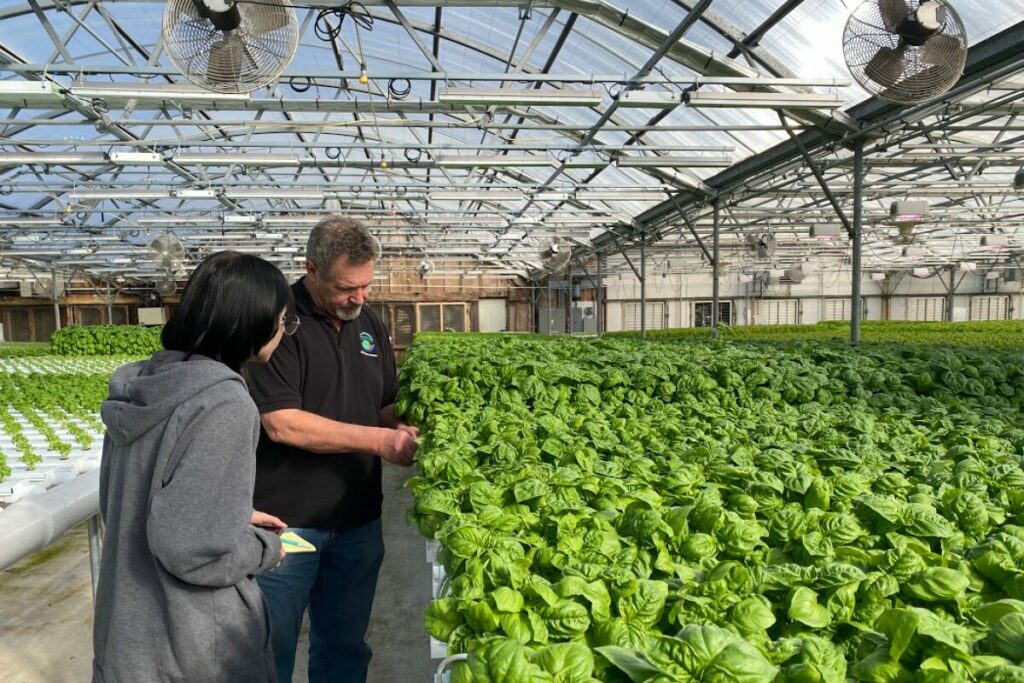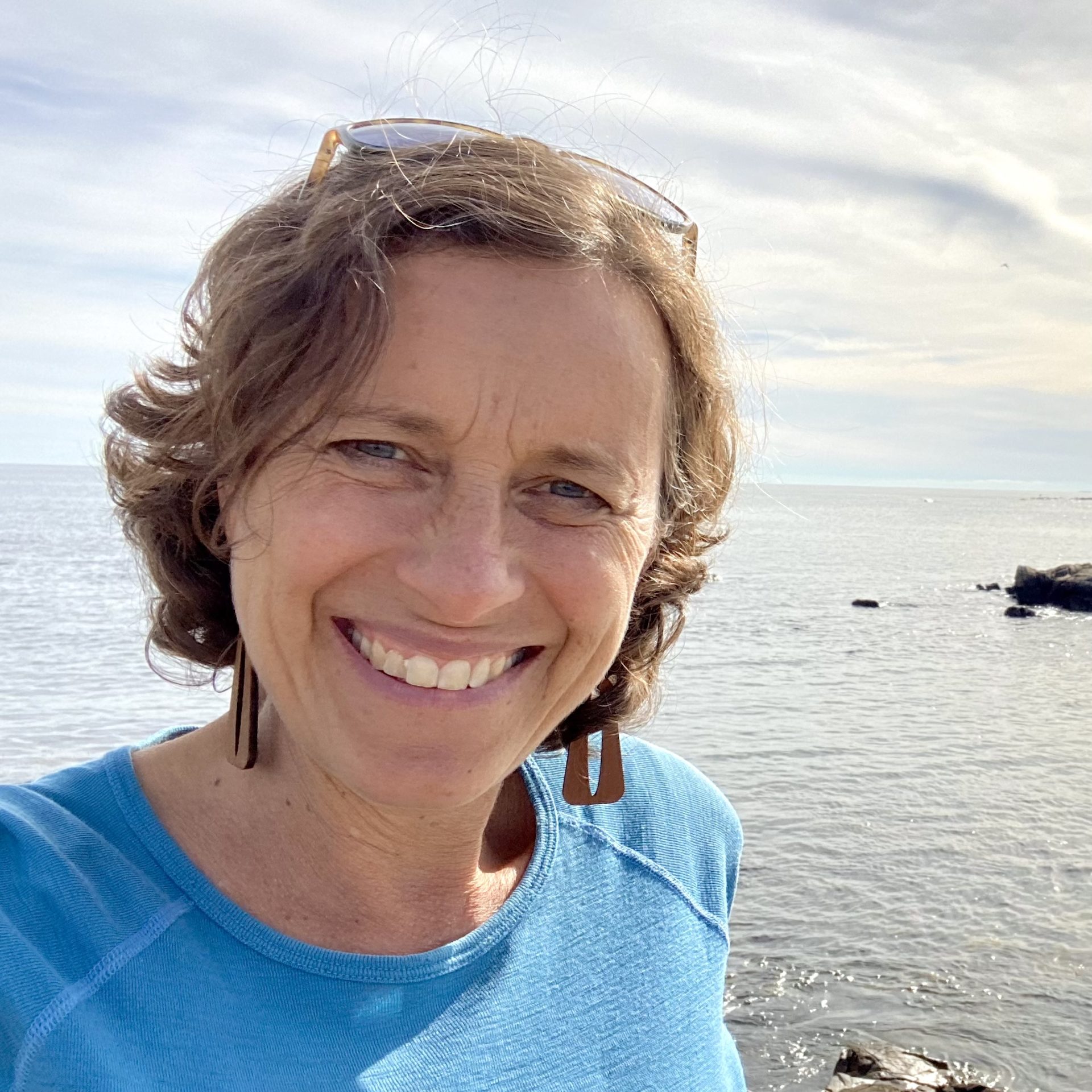We’re allowing students to follow interests, passions, and curiosities that we do not offer here at the school, but we’re also providing a structured program that allows students to explore and investigate careers that they might be interested in and to gain some experience in those areas.
Kim McKellar, Mentor and Work-based Learning Coordinator at U-32 Middle and High School
Kim McKellar is a Mentor and Work-Based Learning Coordinator at U-32, a public middle and high school in Montpelier, Vermont. Endorsed in her role by the state, Kim works with students through three different programs to help connect them to real-world experiences related to their interests. We recently had the opportunity to talk to Kim about these programs and how they empower young learners in the public education system.
Q: Could you describe your role and the programs offered to learners at U-32?
Kim: I work to support three of our programs that allow high school students at U-32 to design their own study and work with a mentor or a community partner. The programs are called Branching Out, Community-Based Learning (CBL), and the Pilot Program. They all work to accomplish similar goals but differ in length and structure. Branching Out is one year in length and is not offered at a specific class time; students schedule individual weekly meetings with the Branching Out advisor and arrange to work in the community and alongside mentors during their free time. CBL is one semester in length, running twice during the year; students have dedicated class time and may be able to use that time to work in the community, with a mentor, or participate in a job shadow. The Pilot is for students who want to self-design about half of their classes; they attend group seminars, work with mentors when needed, and share a cooperative workspace.
The goal is for learners to follow an interest they have or explore a future career. It could be a topic they’re already passionate about or something they want to dive deeper into. We often refer to it as real-world learning because students are actually doing hands-on work. They’re out in the community working with community partners and learning real-world skills.
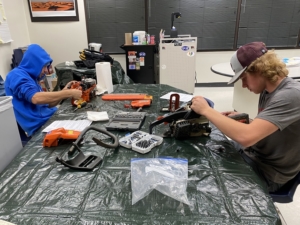
Two learners explore chainsaw maintenance as part of their tree care business job shadow.
Actually, in the classroom next to me, two students have chainsaws completely taken apart on a table. They’re cleaning them for a study they’re doing in tree care and tree removal with a local company. As part of their study, they are also learning about the mechanics of the tools.
I love the work and working with the students. I did my own master’s program with this approach to learning so it’s really a passion of mine. We have students exploring all sorts of topics. This year, for instance, study topics include neuroscience, law enforcement, dog daycare, wildlife biology, forensic science, and naturopathic medicine just to name a few. Depending on the nature of the work and the mentor’s availability, students might meet with their mentors during school time or after school. In terms of age, the majority of the students in our programs are juniors and seniors, but we work with some freshmen and sophomores as well. Participation in our programs isn’t a requirement of the school, but of our 739 students, we have around 30% of our students participate at least once by the time they graduate.
Q: Are these types of programs common across Vermont or is it unique to U-32?
Kim: With the passage of Act 77, Vermont uses a proficiency system, as opposed to the Carnegie letter grade system. There’s an extensive amount of proficiencies that students need to meet in order to graduate, but they are able to earn some of them through our personalized learning programs. What we mostly assess students on is what we refer to as transferable skills — real-world learning like communication, organization, self-awareness, and self-direction, to name a few. A few of our personalized learning programs were in place in our school before Act 77 came into existence as a way to help students explore an interest that wasn’t being offered here at school. When Act 77 came to be, there was a push to provide flexible pathways for students to learn and meet proficiencies toward graduation, including other pathways like early college, dual enrollment, independent studies, and online learning.
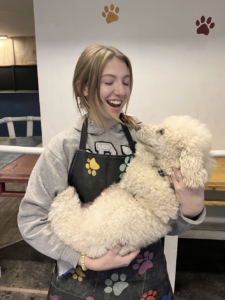
A learner’s job shadow at a local dog daycare business turned into a weekly paid position.
Work-based learning is also one of the pathways. It provides opportunities for students to work, engage in internships, and learn from community partners. I like to say we’re melding two ideas. We’re allowing students to follow interests, passions, and curiosities that we do not offer here at the school, but we’re also providing a structured program that allows students to explore and investigate careers they might be interested in and to gain some experience in those areas. We have a lot of students who are just following something they’re interested in, like cooking. They might want to become a better cook, so we’ll connect them with a mentor with cooking expertise in the community. That student may even have a particular area of interest, such as Asian or African cuisines, or they might just want to learn how to cook in general. We can tailor who they connect with based on their particular interests. Then, it could remain as a hobby or they can choose to take it further and explore it as a career, interviewing local chefs to learn what their jobs are like or seeking out an internship. Sometimes it’s just exploratory, and other times, students are working toward a license or certification.
In some cases, we support students who are close to graduation and don’t know what they want to do next or go to college for. They might work with a mentor and talk to different professionals about what it’s like to be a physical therapist, or a nurse, or a plumber, or whatever they might be interested in.
When students are following a passion of theirs, they’re so much more willing to work hard and be engaged.
Kim McKellar, Mentor and Work-based Learning Coordinator at U-32 Middle and High School
Q: How do learners go about finding mentors and other opportunities in their community?
Kim: Each of our three programs has a teacher advisor who is the director of that program, and then myself as the mentor and work-based learning coordinator. We work in partnership with each student, and we ask that they meet us halfway. For instance, right now I have a student who is interested in wildlife rehabilitation. We’ll meet to put our heads together to see what her goals are and what she wants to learn. If she is new to the subject of wildlife rehabilitation, we’ll really encourage a lot of thinking to see how she can envision working with somebody in the community. I’ll ask her to do some research, and I’ll also take a look at our database. We have about 700 local contacts that we’ve been building over the years. We’ll reach out through email, phone, Facebook — whatever it takes!
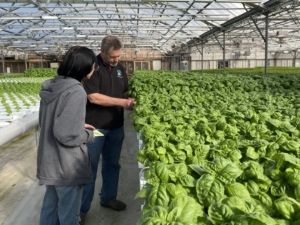
A learner receives a tour of a local hydroponic farm as part of their hydroponic study.
After we’ve done some initial research, I’ll meet again with the student to see what we’ve learned and hopefully set up an initial meeting with a mentor. If the mentor ends up being a good fit, we’ll come up with a plan for the semester or year, depending on the length of the program. A lot of my work involves developing and maintaining those relationships with external partners. We also do background checks and site visits, as well as mid-year and end-of-year check-ins to make sure the relationships are working and that the mentors understand their roles.
I want to give a big shout-out to our community partners and mentors. We couldn’t do this work without the generous volunteering and support of our community. We happen to live in a really great community where there are people who are very willing to help. We do offer mentors a $200 stipend per semester as a token of appreciation; however, we understand it doesn’t come close to covering the amount of time they put in each week with students.
Q: Do you have one or two stories about learners that embody the impact of these programs?
Kim: There are so many; I don’t even know where to start!
At the end of the year, we have something called Decision Day. It’s a ceremony where the 12th-grade students share what their plans are after graduation. They share if they’re going to take a gap year, go into a trade or job, or pursue the military or college. It’s so encouraging to hear that many of the students share a decision based on something they have tried in one of our programs. They’ve had the opportunity to try it on and decided this is the path for them. Seeing the students’ confidence and knowing they chose something they’ve already had the opportunity to explore is fantastic.
We had one freshman who was very interested in military service. He connected with a mentor who was just a few years older than him and in junior ROTC. He shared at a mentor appreciation event that he always hated math and science, but his mentor helped him to see how these were relevant to having a successful military career. It really helped him to become a better learner. When students are following a passion of theirs, they’re so much more willing to work hard and be engaged. It’s really exciting, especially for students who might be struggling in conventional classrooms.
Last year I created a video collage of alumni personalized learning students. All five alumni I interviewed had explored a career interest in one of our programs and then gone on to have a successful, meaningful career in the field. They had become a small business owner, a sports commentator, a social worker, a police officer, and a Coast Guardsman. I shared these videos with our 8th-grade career exploration class to inspire our younger learners to take advantage of our programs while they are in school. The alumni encouraged them to pursue what they love, utilize the supports they have while in school, and be willing to try things and make mistakes. It was really rewarding to hear these successful alumni testimonies, and it reminds us how important this work is.
